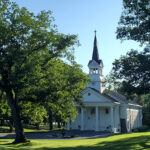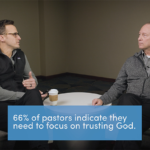
A unified church valuing every generation will have a greater global and eternal impact than any anti-aging technology.
By Aaron Earls
According to popular legend, Spanish explorer Juan Ponce de León scoured the new world searching for the fountain of youth. Today, some are hoping Amazon—not the river but the website, or at least the wealth behind the online retailer—can lead them to eternal life.
Billionaire and Amazon founder Jeff Bezos is part of the funding group for a research company whose goal is to reverse the aging process in humans through the reprogramming of cells. Spanish scientist Carlos Izpisua Belmonte, as if echoing Ponce de León’s fabled journey, called cell reprogramming a potential “elixir of life.”
In his final letter to Amazon shareholders, Bezos quoted Richard Dawkins: “Staving off death is a thing that you have to work at. … More generally, if living things didn’t work actively to prevent it, they would eventually merge into their surroundings, and cease to exist as autonomous beings. That is what happens when they die.”
Billionaires aren’t the only ones seeking to use Amazon to reverse aging. Searching the online retailer for “anti-aging” brings up thousands of products from serums and vitamin supplements to LED light therapy face masks and $5,000 nanocrystal powders.
An aging population in a youth-obsessed culture
“Our western culture places a value on what we do, not who we are,” says Sharon Betters, co-author of Aging With Grace. “You must contribute to society to have purpose, and your contribution must be measurable and have financial value. Such thinking casts aside older people, picturing them as past their prime, valueless, and weak.”
Despite all its best efforts, the United States is increasingly becoming an older nation. The senior citizen population is projected to almost double in the United States over the next few decades. By 2060, over 94 million Americans will be 65 and older, according to U.S. Census Bureau projections.
As the flow of Amazon and the rest of culture pushes society further toward valuing youth and avoiding any appearance of aging, Betters says unfortunately, churchgoers have brought this worldview with them. “Rather than creating an intergenerational strategic plan, the emphasis is often on youth in a way that casts aside the core values of previous generations,” she says. In this mindset, churches gear everything toward the next generation with little concern for those who poured into the church so it could reach this moment. “Programming reflects there is little regard for the changing life needs of older people and the opportunity for the church to care for them as they have cared for the younger generation,” Betters says.
“[Senior adults] are always willing to help in whatever capacity they are able. If there is a need in the church or with an individual, they will find a way to meet that ministry need.” — Damon Simpson Click To TweetWhen asked their top concern about the future of their church, 40% of U.S. Protestant pastors said reaching the next generation, according to a 2018 Lifeway Research study. The next most common concern was a lack of discipleship at 16%. Much of this stems from the current situation in churches, which are often more likely to be filled with retirees than young adults. Many churches may be anxious to target an age demographic they feel is underrepresented in their pews. A third of U.S. congregations are senior citizens, according to the 2020 Faith Communities Today (FACT) study. Churchgoers are twice as likely as the average American to be 65 and older.
But not all older Americans attend church. According to the latest General Social Survey, more than 1 in 4 senior citizens (27%) say they never attend religious services. And those who currently attend may feel ignored or even exploited as they see the entire focus of the church’s ministry move away from them. Betters says some senior adults try to communicate the need for “older people to be included, honored, and respected, but they are often viewed as selfish by church leadership and exhorted to put aside their own needs for the sake of the younger generation.” Additionally, she says others “recognize their voice has been silenced so they quietly slip away and no one from the church pursues them.”
According to Barna’s “Aging Well” report, half of pastors say ministry to older adults is a high priority for their church. But most (59%) say their congregation doesn’t currently have someone serving in a role that is specifically dedicated to ministering to older adults. It may not require a dedicated staff position at every church, but serving older church members does require attention.
Making the church different
Damon Simpson had worked with senior adults for more than 20 years as part of his ministry as an education pastor, but he felt a strong call in 2022 to work more directly with them. Currently, he serves as the minister to senior adults at Prestonwood Baptist Church North Campus in Prosper, Texas. He says older members want to know they have value. “They are always willing to help in whatever capacity they are able,” he says. “If there is a need in the church or with an individual, they will find a way to meet that ministry need.” Specifically, Simpson says he tries to give them opportunities to serve alongside each other but with multi-generational involvement. “I then give the senior adults the assignment of ‘coaching’ the students or young adults,” he says.
“We need to be careful not to under-challenge our mature members,” says Mark Dance, director of pastoral wellness for Guidestone Financial Resources. Churches should ask older members to serve in visible positions according to their giftedness. “Every generation likes to see a representative of themselves on stage, online, or in visible serving roles,” Dance says. “Whether it’s a leadership role or a servant role in a high-traffic area alongside other generations, the message is not lost on them.”
“Every generation likes to see a representative of themselves on stage, online, or in visible serving roles. The message is not lost on them.” — @markdance Click To TweetIn addition to allowing them to serve, churches should prioritize ways in which they can specifically serve their older members, says Simpson. He says to identify specific needs senior citizens in the congregation are experiencing. “For example, all senior adults deal with Medicare. This is very confusing for all of them,” he says. “Find a Medicare specialist who can come in and help them understand the different parts of Medicare.” Simpson also suggested providing low- or no-cost opportunities for older adults to speak to an attorney about their will. Other issues could be widows who need people to help with basic home care and maintenance. Evaluate the needs of the senior adults in your congregation and find ways you can help address them.
For younger pastors with older congregants, Dance says “simply show up at events that have maximum impact: monthly senior adult luncheons, an annual one-night road trip, Christmas parties, etc.” The presence of the pastor indicates a prioritization of the people. It doesn’t have to be every event, but make sure they know you care by showing up.
Making time for older members may also mean just listening. Simpson says one day a man came to their church and wanted to talk to a pastor. “As I sat and talked to this 76-year-old disabled veteran, I learned he had wanted no part of God his whole life because he blamed God for taking his friends in the war and for his difficult life,” Simpson says. “God had begun to soften his heart when I was able to talk to him. He gave his life to Christ that day, and I had the privilege of baptizing him a few weeks later.”
Aging as the pastor
Not only is the average churchgoer getting older, but often the same is true for the pastor. The average U.S. clergy member is 57 compared to 50 in 2000, according to the FACT study. Lifeway Research analysis of U.S. Protestant pastors found relative stability in the past decade, but the average age was still near 54.
Through their own aging, pastors can provide an example to their congregation. “Embrace and enjoy the stage of life you are in,” says Dance, author of Start to Finish, a guide to help pastors start and finish their ministry well. “Trying to turn back the clock ends up being awkward for everybody.”
How pastors respond to growing older flows from their own beliefs. “We are all products of our theology. What we believe, or don’t believe, about God shows up every day,” Betters says. “The church is a family, weakened when we ignore or push out one age or another. God does not cast aside people but rather honors them in the story of redemption.”
She says the priority of the aging pastor—or any pastor—should be a reflection of God’s love and calling. “We become life-givers rather than life-takers because we have Scripture-driven identity and purpose in what we are doing,” Betters says. “Scripture gives us an overarching purpose as we soak in knowing we are His image bearers created to reflect His glory, no matter our age.”
The church will follow the pastor’s approach to aging. “It is imperative for church leaders to embrace and teach God’s view of aging, especially in our culture,” Betters says. “This biblical view of aging will influence the church’s attitude and strategic planning to intentionally create an intergenerational community where all ages respect, value, and welcome one another.”
“In a world soaked in conflict and division, when a church is a genuine intergenerational family, others notice and are drawn to the possibility of inclusion.” — Sharon Betters Click To TweetAiming for the Kingdom of God not the fountain of youth
The church must swim upstream to recognize the dignity and worth of older individuals. Doing so may bring unexpected benefits, as those that know how to serve and unleash retirement-age members for service place themselves in a strong position to grow and even reach other generations. “A church committed to the core value of family intentionally includes older people in strategic planning, committees, worship, mentoring, leading Bible studies, and encouraging their members that no matter the age, God’s children are His image bearers, designed to glorify and enjoy Him forever,” Betters says. “Such a commitment will help resolve unnecessary age discrimination conflicts. In a world soaked in conflict and division, when a church is a genuine intergenerational family, others notice and are drawn to the possibility of inclusion.”
A unified church valuing every generation will have a greater global and eternal impact than any anti-aging technology. The Kingdom of God is better than the fountain of youth.
For permission to republish this article, contact Marissa Postell Sullivan.












